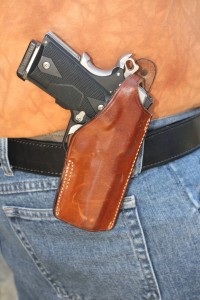By Dave Workman | Senior Editor
A ruling by the U.S. Sixth Circuit Court of Appeals in a Toledo, Ohio case amounts to a victory for open carry activists and Fourth Amendment advocates.
A three-judge panel on the court ruled that Toledo resident Shawn Northrup can sue a city police officer for detaining him illegally on June 16, 2010 because he was openly carrying a semiautomatic pistol while walking with his wife, daughter, grandson and their dog.
According to the summary of the incident, a motorcyclist identified as Alan Rose stopped and loudly told Northrup that he “can’t walk around with a gun like that!” An exchange of words ensued between Rose and Denise Northrup, Shawn’s wife. Rose subsequently called the police to report a man walking around with a gun. The police dispatcher said this was legal, the court narrative noted, provided the person has a carry permit. At that point, Rose apparently had a change of heart, but the dispatcher sent an officer to investigate, anyway.
Northrup was stopped, disarmed and handcuffed, and detained for about 30 minutes by Officer David Bright, according to the ruling, which may be read here .
.
The court noted that “Clearly established law required Bright to point to evidence that Northrup may have been ‘armed and dangerous.’ Yet all he ever saw was that Northrup was armed—and legally so. To allow stops in this setting ‘would effectively eliminate Fourth Amendment protections for lawfully armed persons’.”
Writing for the panel, Circuit Judge Jeffrey Sutton observed, “This requirement and the impropriety of Officer Bright’s demands are particularly acute in a State like Ohio. Not only has the State made open carry of a firearm legal, but it also does not require gun owners to produce or even carry their licenses for inquiring officers.”
“While open-carry laws may put police officers…in awkward situations from time to time,” the judge continued, “the Ohio legislature has decided its citizens may be entrusted with firearms on public streets. The Toledo Police Department has no authority to disregard this decision—not to mention the protections of the Fourth Amendment—by detaining every “gunman” who lawfully possesses a firearm.
“And,” Judge Sutton added, “it has long been clearly established that an officer needs evidence of criminality or dangerousness before he may detain and disarm a law-abiding citizen. We thus affirm the district court’s conclusion that, after reading the factual inferences in the record in Northrup’s favor, Officer Bright could not reasonably suspect that Northrup needed to be disarmed.”
Writing for the Washington Post, Eugene Volokh noted: “The police are free to approach people to ask them questions, even without reasonable suspicion that the people are violating the law. They can order a person to stop for a short while if they have reasonable suspicion that the person is committing a crime or about to commit a crime. They can certainly disarm him and arrest him if they reasonably think that he’s about to shoot them, or if he is otherwise threatening them (something that the police alleged here, but that the court said is a fact question for the jury).
“But to coercively stop a person — and certainly to handcuff the person, which is what happened in this case — the police do have to have such reasonable suspicion,” Volokh explained. “And if all they see is someone openly carrying a gun in a state in which such open carry is legal, the Fourth Amendment prevents them from ‘search[ing]’ or ‘seiz[ing]’ that person. One can support open carry or oppose it…but if open carry is legal, this result seems quite right under Fourth Amendment law.”
This ruling does not directly affect open carry in other states, but circuit courts do pay attention to opinions from other circuits.
Northrup’s attorney, Daniel T. Ellis, was quoted by the Toledo Blade asserting, “Columbus is very restrictive. Cleveland is kind of restrictive. Cincinnati is restrictive. I think Toledo is getting better. Police officers do not want people to carry firearms. They seem not to want to abide by the Constitution that allows people to do so.”



